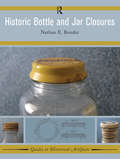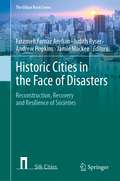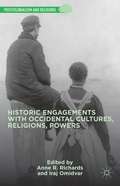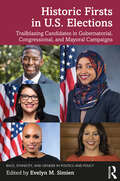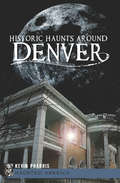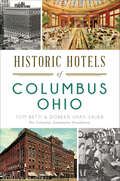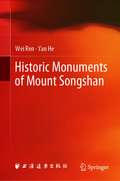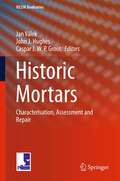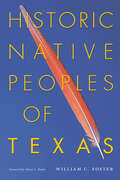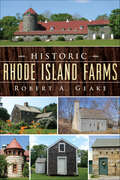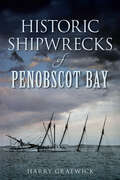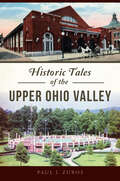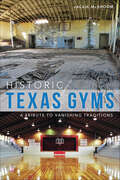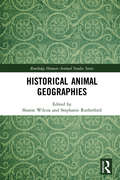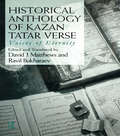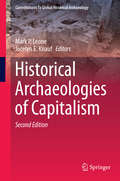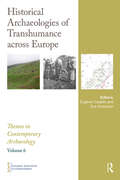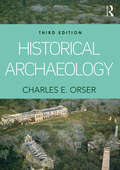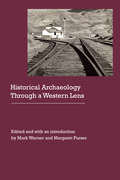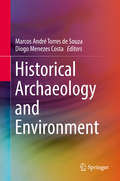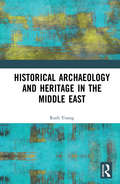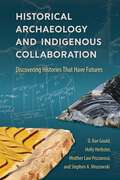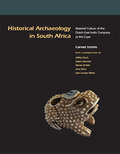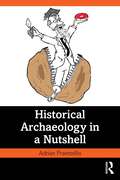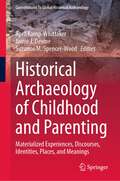- Table View
- List View
Historic Bottle and Jar Closures (Guides To Historical Artifacts Ser. #6)
by Nathan E BenderThis book presents a much-needed review of commercial closures for bottles and jars used in America prior to World War II. Archaeological attention to commercial closures has been rather limited. This is surprising given that data derived from bottles and jars pertain to a wide range of studies, including chronological control, trade, site functions, and methods of manufacture. Closures are an integral part of these studies, becoming particularly important after a spectacular variety of metal and glass caps in the late nineteenth and early twentieth centuries. This volume-provides a comprehensive review, including detailed closure definitions, as well as glass finishes;-discusses the history of the development and impact of the hermetic seal in commercial closures;-will appeal to students, professionals, and collectors studying this common historic artifact class.
Historic Cities in the Face of Disasters: Reconstruction, Recovery and Resilience of Societies (The Urban Book Series)
by Fatemeh Farnaz Arefian Andrew Hopkins Judith Ryser Jamie MackeeThis book examines reconstruction and resilience of historic cities and societies from multiple disciplinary and complementary perspectives and, by doing so, it helps researchers and practitioners alike, among them reconstruction managers, urban governance and professionals. The book builds on carefully selected and updated papers accepted for the 2019 Silk Cities international conference on ‘reconstruction, recovery and resilience of historic cities and societies’, the third Silk Cities conference held in L’Aquila, Italy, 10-12 July 2019, working with University of L’Aquila and UCL.This multi-scale, and multidisciplinary book offers cross-sectoral and complimentary voices from multiple stakeholders, including academia, urban governance, NGOs and local populations. It examines post-disaster reconstruction strategies and case studies from Europe, Asia and Latin America that provide a valuable collection for anyone who would like to get a global overview on the subject matter. It thereby enables a deeper understanding of challenges, opportunities and approaches in dealing with historic cities facing disasters at various geographical scales. Additionally, it brings together historical approaches to the reconstruction of historical cities and those of more recent times. Thus, it can be used as a reference book for global understanding of the subject matter.
Historic Engagements with Occidental Cultures, Religions, Powers
by Anne R. Richards Iraj OmidvarThis book explores centuries of power relations and imperial and civilizing rhetorics, overarching themes highlighted in these infrequently heard accounts by eastern travelers to the West. Considered in depth are evolutions in mental frameworks and practices that led to the emergence of anticolonial consciousness and strategies of protest.
Historic Firsts in U.S. Elections: Trailblazing Candidates in Gubernatorial, Congressional, and Mayoral Campaigns (Race, Ethnicity, and Gender in Politics and Policy)
by Evelyn M. SimienHistoric Firsts in U.S. Elections:Trailblazing Candidates in Gubernatorial, Congressional, and Mayoral Campaigns examines barrier-breaking figures across various types of elective offices and constituent groups. The moment in which historic firsts enter the electoral arena, and the unique campaigns that ensue, are shown to be symbolically empowering. These change agents on the campaign trail become lighting rods for more liberal policies, and their candidacies are tied to questions of representation, electability, and performance. The distinctive combinations of race, ethnicity, and gender identities represented here translate into voter excitement to go to the polls and participate in other ways. Original chapters by respected scholars and practitioners consider how recent breakthrough elections are similar to yet different from past elections for gubernatorial, congressional, and mayoral offices. The shadow of Donald Trump’s wildly unconventional U.S. presidency looms over this groundbreaking analysis, linking local to national level politics. For students of politics across the curriculum, this book expands the theoretical capacity of intersectionality research and links it to voter mobilization and electoral success.
Historic Haunts Around Denver (Haunted America)
by Kevin PharrisThe author of The Haunted Heart of Denver goes beyond the city limits to investigate the supernatural surroundings of Colorado&’s capital. In Denver, the spirits aren&’t just penned to the city center. No, even the suburbs and outlying cities have the kind of history that could give quite a fright to the unsuspecting. Folks might be surprised to learn that a house in northwest Denver comes fully equipped with a basement theater—and spectral performers as well—and former phantom residents still roam their old homestead in what is now an Adams County open space. From Westminster&’s Bowles House Museum, where even the ghosts were involved in renovations, to Littleton&’s Melting Pot restaurant, a former Carnegie library that offers diners a side of the supernatural, accidental ghost hunter Kevin Pharris explores further tales of supernatural haunts and unexplained phenomena surrounding the Mile High City. Includes photos!
Historic Hotels of Columbus, Ohio (Landmarks)
by Tom BettiThough only a handful remain today, the Capital City once boasted a wealth of illustrious hotels and raucous two-bit establishments. Grande dame hotels like the Neil House, the Great Southern, the Hartman, the Chittenden and the Deshler achieved the height of elegance and refinement. More modest establishments were frequented by fugitive Confederate generals, notorious bootleggers and Fidel Castro's family. Join the Gilded Age bachelors who decked out banquet halls to look like camping sites and the Hungarian revolutionaries who failed to keep a low profile. From devastating hotel fires to ornate outhouse fittings, authors Tom Betti and Doreen Uhas Sauer introduce you to a whole new side of Columbus history.
Historic Monuments of Mount Songshan
by Yan He Wei RenThis book tells the story of the Mount Songshan area architecture in simple terms, while also providing detailed information on the history of Buddhist architecture. The history of the Mount Songshan area can be traced back to the Xia Dynasty in the 23rd century B.C. The heritage architecture in this area has seen the rise and fall of various powers – including the Han Dynasty, Northern Wei Dynasty, Tang and Song Empires, Jin Dynasty, Yuan Dynasty, and the Ming and Qing Empires – and reflects the character of each historical period. Over the past 2,000 years, history has been continuously woven into the architecture. The Mount Songshan area is, therefore, a perfect representation of the perpetual Chinese civilization, and the most magnificent museum of ancient Chinese architecture. Most importantly, these various types of architecture offer valuable insights into the architectural design and technologies of each historical period. The products of ingenuity and innovation, they are marvellous creations that ancient Chinese people took great pride in.
Historic Mortars
by Caspar J. Groot Jan Válek John J. HughesThis volume focuses on research and practical issues connected with mortars on historic structures. The book is divided into four sections: Characterisation of Historic Mortars, Repair Mortars and Design Issues, Experimental Research into Properties of Repair Mortars, and Assessment and Testing. The papers present the latest work of researchers in their field. The individual contributions were selected from the contributions to the 2nd Historic Mortars Conference, which took place in Prague, September, 22-24, 2010. All papers were reviewed and improved as necessary before publication. This peer review process by the editors resulted in the 34 individual contributions included in here. One extra paper reviewing and summarising State-of-the-Art knowledge covered by this publication was added as a starting and navigational point for the reader. The editors believe that having these papers in print is important and they hope that it will stimulate further research into historic mortars and related subjects.
Historic Native Peoples of Texas
by William C. FosterSeveral hundred tribes of Native Americans were living within or hunting and trading across the present-day borders of Texas when Cabeza de Vaca and his shipwrecked companions washed up on a Gulf Coast beach in 1528. Over the next two centuries, as Spanish and French expeditions explored the state, they recorded detailed information about the locations and lifeways of Texas's Native peoples. Using recent translations of these expedition diaries and journals, along with discoveries from ongoing archaeological investigations, William C. Foster here assembles the most complete account ever published of Texas's Native peoples during the early historic period (AD 1528 to 1722). Foster describes the historic Native peoples of Texas by geographic regions. His chronological narrative records the interactions of Native groups with European explorers and with Native trading partners across a wide network that extended into Louisiana, the Great Plains, New Mexico, and northern Mexico. Foster provides extensive ethnohistorical information about Texas's Native peoples, as well as data on the various regions' animals, plants, and climate. Accompanying each regional account is an annotated list of named Indian tribes in that region and maps that show tribal territories and European expedition routes. This authoritative overview of Texas's historic Native peoples reveals that these groups were far more cosmopolitan than previously known. Functioning as the central link in the continent-wide circulation of trade goods and cultural elements such as religion, architecture, and lithic technology, Texas's historic Native peoples played a crucial role in connecting the Native peoples of North America from the Pacific Coast to the Southeast woodlands.
Historic Rhode Island Farms (Landmarks)
by Robert A. GeakeDating back to the colonial era, the historic barns and outbuildings of Rhode Island have withstood the test of time. From the state's early barnyard taverns to the modern-day horse and dairy farms that populate rural Rhode Island, each of these buildings has a story to tell. In the mid-eighteenth century, the Narragansett planters bred horses on their farms in southern Rhode Island. Later, dairy farms sprang up across the region. Milking barns were built on the largest farms in the state, including the Theinhert Dairy Farm and Barn in Lincoln. Before the advent of electric trolleys, urban barns sheltered horses for early tramcar transportation. Each barn is a beloved reminder of the state's history. Join author Robert A. Geake as he explores the origins and evolution of Rhode Island's farms.
Historic Shipwrecks of Penobscot Bay (Disaster Ser.)
by Harry GratwickAn in-depth history of the Maine inlet&’s most historic and dramatic shipwrecks. Thousands flock to the beautiful coastline along Penobscot Bay every year, but the dark sea has often turned treacherous. Temperamental skies become stormy without notice; violent gales challenge even the most seasoned captains. Craggy rocks can be virtually invisible to oncoming vessels, like the Alice E. Clark, which simply strayed off course in good weather. Other ships, like the Governor Bodwell and Royal Tar, were destroyed by fire. But not all the ships were a total loss—some were repaired and resumed life under different names. Local author Harry Gratwick explores some of Penobscot Bay&’s most historic and dramatic shipwrecks, from what caused the wrecks to what happened during those fateful moments when the ships were going down.
Historic Tales of the Upper Ohio Valley (American Chronicles)
by Paul ZurosLocal historian Paul J. Zuros weaves a rich narrative of the region, reliving these tales as only a local can. The Upper Ohio River runs along the border between West Virginia and Ohio, where the cities of Weirton and Steubenville face each other across the flowing water. The history of these two municipalities has been intertwined from their earliest days. Discover stories of the early pioneers on both sides of the river and what they learned about their Native American predecessors. Tales of bygone celebrations will entertain, and rumors of local haunts will chill readers to the bone. The stories of these industrial centers as well as their preindustrial past will intrigue and delight young and old.
Historic Texas Gyms: A Tribute to Vanishing Traditions (Landmarks)
by Jackie McBroomFor generations of small-town Texans, the school gymnasium was the hub of the community. If it was a Tuesday night in Texline, most folks could be found in the old tin barn of a gym, rooting for their Tornadoes against the arch-rival Adrian Matadors. Transcending the role of a sports arena, the gym also provided a place to gather in celebration or shelter in crisis. Sadly, with the dramatic reduction of school districts around the state, many of the polished floorboards that once hosted graduations and beauty pageants now splinter beneath the weight of storage, farm equipment and guano-covered junk. From the pickup basketball game Elvis played in Hawkins to the tragic account of four Ennis war heroes, Jackie McBroom recounts stories from these beloved halls.
Historical Animal Geographies (Routledge Human-Animal Studies Series)
by Stephanie Rutherford Sharon WilcoxArguing that historical analysis is an important, yet heretofore largely underexplored dimension of scholarship in animal geographies, this book seeks to define historical animal geography as the exploration of how spatially situated human–animal relations have changed through time. This volume centers on the changing relationships among people, animals, and the landscapes they inhabit, taking a spatio-temporal approach to animal studies. Foregrounding the assertion that geography matters as much as history in terms of how humans relate to animals, this collection offers unique insight into the lives of animals past, how interrelationships were co-constructed amongst and between animals and humans, and how nonhuman actors came to make their own worlds. This collection of chapters explores the rich value of work at the contact points between three sub-disciplines, demonstrating how geographical analyses enrich work in historical animal studies, that historical work is important to animal geography, and that recognition of animals as actors can further enrich historical geographic research.
Historical Anthology of Kazan Tatar Verse
by David Matthews Ravil BukharaevThis anthology expounds the rich history of Kazan Tatar poetry, which has its beginnings in the early 12th century. Poets bear witness to the cultural, political as well as spiritual history of their nations, and in this sense, the history of poetry is the history of the nation. The authors try to single out the main themes of Kazan Tatar poetry in every epoch and period of time, the most penetrating of which is the theme of forceful alienation from one's motherland. The anthology unfolds against a rich and colourful background of social, cultural and political settings of each epoch, and presents Kazan Tatar poetry as it is, preserving its rhythmical, visual and rhyming structure supported by commentaries.
Historical Archaeologies of Capitalism
by Mark P. Leone Jocelyn E. KnaufThis new edition of Historical Archaeologies of Capitalism shows where the study of capitalism leads archaeologists, scholars and activists. Essays cover a range of geographic, colonial and racist contexts around the Atlantic basin: Latin America and the Caribbean, North America, the North Atlantic, Europe and Africa. Here historical archaeologists use current capitalist theory to show the results of creating social classes, employing racism and beginning and expanding the global processes of resource exploitation. Scholars in this volume also do not avoid the present condition of people, discussing the lasting effects of capitalism's methods, resistance to them, their archaeology and their point to us now. Chapters interpret capitalism in the past, the processes that make capitalist expansion possible, and the worldwide sale and reduction of people. Authors discuss how to record and interpret these. This book continues a global historical archaeology, one that is engaged with other disciplines, peoples and suppressed political and economic histories. Authors in this volume describe how new identities are created, reshaped and made to appear natural. Chapters in this second edition also continue to address why historical archaeologists study capitalism and the relevance of this work, expanding on one of the important contributions of historical archaeologies of capitalism: critical archaeology.
Historical Archaeologies of Transhumance across Europe (Themes in Contemporary Archaeology)
by Eugene Costello Eva SvenssonTranshumance is a form of pastoralism that has been practised around the world since animals were first domesticated. Such seasonal movements have formed an important aspect of many European farming systems for several thousand years, although they have declined markedly since the nineteenth century. Ethnographers and geographers have long been involved in recording transhumant practices, and in the last two decades archaeologists have started to add a new material dimension to the subject. This volume brings together recent advances in the study of European transhumance during historical times, from Sweden to Spain, Romania to Ireland, and beyond that even Newfoundland. While the focus is on the archaeology of seasonal sites used by shepherds and cowherds, the contributions exhibit a high degree of interdisciplinarity. Documentary, cartographic, ethnographic and palaeoecological evidence all play a part in the examination of seasonal movement and settlement in medieval and post-medieval landscapes. Notwithstanding the obvious diversity across Europe in terms of livestock, distances travelled and socio-economic context, an extended introduction to the volume shows that cross-cutting themes are now emerging, including mobility, gendered herding, collective land-use, the agency of non-elite people and competition for grazing and markets. The book will appeal not only to archaeologists, but to historians, geographers, ethnographers, palaeoecologists and anyone interested in rural lifeways across Europe.
Historical Archaeology
by Charles E. Orser Jr.This book provides a short, readable introduction to historical archaeology, which focuses on modern history in all its fascinating regional, cultural, and ethnic diversity. Accessibly covering key methods and concepts, including fundamental theories and principles, the history of the field, and basic definitions, Historical Archaeology also includes a practical look at career prospects for interested readers. Orser discusses central topics of archaeological research such as time and space, survey and excavation methods, and analytical techniques, encouraging readers to consider the possible meanings of artifacts. Drawing on the author’s extensive experience as an historical archaeologist, the book’s perspective ranges from the local to the global in order to demonstrate the real importance of this subject to our understanding of the world in which we live today. The third edition of this popular textbook has been significantly revised and expanded to reflect recent developments and discoveries in this exciting area of study. Each chapter includes updated case studies which demonstrate the research conducted by professional historical archaeologists. With its engaging approach to the subject, Historical Archaeology continues to be an ideal resource for readers who wish to be introduced to this rapidly expanding global field.
Historical Archaeology Through a Western Lens (Historical Archaeology of the American West)
by Mark Warner Margaret PurserA 2017 Choice Outstanding Academic Title The mythic American West, with its perilous frontiers, big skies, and vast resources, is frequently perceived as unchanging and timeless. The work of many western-based historical archaeologists over the past decade, however, has revealed narratives that often sharply challenge that timelessness. Historical Archaeology Through a Western Lens reveals an archaeological past that is distinct to the region—but not in ways that popular imagination might suggest. Instead, this volume highlights a western past characterized by rapid and ever-changing interactions between diverse groups of people across a wide range of environmental and economic situations. The dynamic and unpredictable lives of western communities have prompted a constant challenging and reimagining of both individual identities and collective understandings of their position within a broader national experience. Indeed, the archaeological West is one clearly characterized by mobility rather than stasis. The archaeologies presented in this volume explore the impact of that pervasive human mobility on the West—a world of transience, impermanence, seasonal migration, and accelerated trade and technology at scales ranging from the local to the global. By documenting the challenges of both local community-building and global networking, they provide an archaeology of the West that is ultimately from the West.
Historical Archaeology and Environment
by Marcos André Souza Diogo Menezes CostaThis edited volume gathers contributions focused on understanding the environment through the lens of Historical Archaeology. Pressing issues such as climate change, global warming, the Anthropocene and loss of biodiversity have pushed scholars from different areas to examine issues related to the causes, processes, and consequences of these phenomena. While traditional barriers between natural and social sciences have been torn down, these issues have gradually occupied a central place in the field of anthropology. As archaeology involves the transdisciplinary study of cultural and natural evidence related to the past, it is in a privileged position to discuss the historical depth of some of the processes related to environment that are deeply affecting the world today. This volume brings together substantial and comprehensive contributions to the understanding of the environment in a historical perspective along three lines of inquiry: Theoretical and methodological approaches to the environment in Historical Archaeology Studies on environmental Historical Archaeology Historical Archaeology and the Anthropocene Historical Archaeology and Environment will be of interest to researchers in both social and environmental sciences, working in different disciplines and research areas, such as archaeology, history, geography, anthropology, climate change studies, environmental analysis and sustainable development studies.
Historical Archaeology and Heritage in the Middle East
by Ruth YoungLandlord villages dominated Iranian land tenure for hundreds of years, whereby one powerful landlord owned the village structures, surrounding farmland, and to all intents and purposes, the village occupants themselves, a system that in some cases remained in place up to the 1979 Islamic Revolution. In Oman, mud-brick oases were home to most of the rural population right up until Sultan Qaboos came to power in 1970, and required inhabitants of mud-brick houses to relocate into new concrete block buildings. Historical Archaeology and Heritage in the Middle East explores these everyday, rural communities in Iran and Oman in the 19th and 20th centuries, through a combination of building analysis, excavation, artefact analysis and ethnographic interviews. Drawing on the results of original field projects, the book considers new ways of exploring traditional lifeways, giving voice to hitherto largely ignored sections of the population, and offers new and different ways of thinking about how these people lived and what shaped their lives and the impact of major political and social changes on them. Place, memory and belonging are considered through the lens of material culture within these villages. The first of its kind, the book brings together methodologies, research questions, and themes that have never been used or addressed in the Middle East. Helping to establish historical archaeology in the Middle East and providing new ways in which the memorable, quotidian past can be exploited for its social and economic value in contemporary community and heritage developments, it is an ideal resource for students, scholars and practitioners of historical archaeology and heritage of and in the Middle East.
Historical Archaeology and Indigenous Collaboration: Discovering Histories That Have Futures
by Stephen A. Mrozowski D. Rae Gould Holly Herbster Heather Law PezzarossiSociety for American Archaeology Scholarly Book AwardCollaborative archaeological projects focused on the Nipmuc people of New England that offer a model for research incorporating Indigenous knowledge and scholarship Highlighting the strong relationship between New England’s Nipmuc people and their land from the pre-contact period to the present day, this book helps demonstrate that the history of Native Americans did not end with the arrival of Europeans. This is the rich result of a twenty-year collaboration between indigenous and nonindigenous authors, who use their own example to argue that Native peoples need to be integral to any research project focused on indigenous history and culture. The stories traced in this book center around three Nipmuc archaeological sites in Massachusetts—the seventeenth century town of Magunkaquog, the Sarah Boston Farmstead in Hassanamesit Woods, and the Cisco Homestead on the Hassanamisco Reservation. The authors bring together indigenous oral histories, historical documents, and archaeological evidence to show how the Nipmuc people outlasted armed conflict and Christianization efforts instigated by European colonists. Exploring key issues of continuity, authenticity, and identity, Historical Archaeology and Indigenous Collaboration provides a model for research projects that seek to incorporate indigenous knowledge and scholarship.
Historical Archaeology in South Africa: Material Culture of the Dutch East India Company at the Cape
by Carmel SchrireThis volume documents the analysis of excavated historical archaeological collections at the Cape of Good Hope, South Africa. The corpus provides a rich picture of life and times at this distant outpost of an immense Dutch seaborne empire during the contact period. Representing over three decades of excavation, conservation, and analysis, the book examines ceramics, glass, metal, and other categories of artifacts in their archaeological contexts. An enclosed CD includes a video reconstruction plus a comprehensive catalog and color illustrations of the artifacts in the corpus. The parallels and contrasts this volume reveals will help scholars studying the European expansion period to build a richer comparative picture of colonial material culture.
Historical Archaeology in a Nutshell
by Adrian PraetzellisHistorical Archaeology in a Nutshell is a textbook for students studying historical archaeology for the first time.The book presents historical archaeology’s contribution to understanding the world in a series of bite-sized, topic-specific, and intellectually contextualized chapters that do not presuppose much prior knowledge of archaeology. Each chapter covers a theme commonly explored by historical archaeologists such as identity, race and racialization, colonization and Indigenous peoples, diasporas and transnationalism, religion, and war. Chapters can be read in any order in about 30 minutes and show why and how archaeologists explore the topic. Each starts with something about ontology (why would anyone care about this topic?), explains the range of approaches archaeologists apply to it, presents a relevant case study that synthesizes method and theory, and concludes with some thought-provoking discussion questions. Using examples from around the world, the book supports historical archaeology as a global discipline.As supplementary reading in an introductory archaeology course or as one of the main texts in a course dedicated to historical archaeology, this book will provide students with a focused and easily comprehensible introduction to the subject.
Historical Archaeology of Childhood and Parenting: Materialized Experiences, Discourses, Identities, Places, and Meanings (Contributions To Global Historical Archaeology)
by Suzanne M. Spencer-Wood April Kamp-Whittaker Jamie J. DevineThe study of childhood in historical archaeology enriches interpretations of the past, but also has the potential for contributing to the understanding of methodological and theoretical issues in archaeology. Archaeologically, children are understudied relative to both their demographic and social importance, partly because children are viewed as difficult to discern in the archaeological record. Historical archaeology, with its access to historical documents to supplement and illuminate archaeological evidence, provides an opportunity to gain a greater understanding of the ways children's daily lives in the past were expressed in historically changing types and patterns of material culture. Recent research presented in this volume contributes valuable perspectives for conceptualizing the historically changing social nature of childhood and methods for illuminating the roles of children. Case studies are designed to illustrate methodological and theoretical advances in the historical archaeology of materialized experiences, discourses, identities, places and their meanings associated with parenting and childhood. The volume is organized into three sections devoted to case studies about 1) how childhood and parenting have been socially constructed cross culturally and temporally, 2) social ideologies of childhood in contested spaces, and 3) the relationship between children's experiences and adult expectations of childhood. Each chapter demonstrates advances in current methods or theories used in the archaeology of childhood. A final discussant, drawn from the broader field of research on the archaeology of childhood, provides a commentary on the ways the perspectives provided in the volume can be employed by researchers outside the sub-discipline of historical archaeology.
